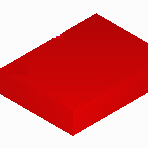| CAD/CAM |
|
CAD stands for Computer
Aided Design.
CAD systems consist of the hardware and software needed to enable
designers to produce accurate plans and drawings.
|
|
|
|
A CAD workstation may be a standalone
or a networked computer. It would have
...
- a powerful processor - needed
for some of the processes such as 3D rendering.
- a powerful graphics card and a
high resolution monitor.
- input devices such as mouse, light
pen, graphics tablet, keyboard.
- output devices such as printer, graph
plotter.
- backing store devices such as a hard drive
for saving designs.
|
|
|
|
|
CAD software would allow a user to...
- draw lines, and polygons
of any size.
- draw curves, circles.
- draw on a number of different layers.
- zoom for adding fine detail.
- perform transformations such as scaling
or rotating.
- rendering of surfaces.
- view objects in 2D or 3D
using different lighting effects, walkthroughs.
Some CAD software allows analysis
of stresses, liquid flow etc...or testing of electronic circuits. |
|
|
|

|
Examples of CAD :
-
Designing Components and moulds.
-
Design of kitchen or garden.
-
Design of electronic circuit boards.
-
fashion design.
|
|
|
CAM stands for Computer
Aided Manufacture.
In a CAD/CAM system, output from a CAD design is converted into a
sequence of instructions for special machines which then manufacture the
component.
CNC (Computer Numerical Control)
machines use numerical input as instructions for the machine to
manufacture an object.
CNC machines may be..
- a lathe for turning metal or wood.
- milling machines for cutting metal shapes.
- drills
- welding machines
- soldering machines
- water jet machines
- lasers
- router or engraver
- robotic arms
Some CNC machines have automatic tool-changing facilities.
|

|
|
Advantages of CAD/CAM systems:
- good accuracy and precision.
- fine detail can be added.
- reliable and consistent results.
- fast development of designs.
- design facilities such as 3D views and walkthroughs and lighting
changes can not easily be done on paper.
- easy editing of designs.
- some automatic calculations such as material costings.
|
|
|
Disadvantages of CAD/CAM systems:
- Expensive to buy and set up the hardware and software.
- Staff will need to be trained to use it.
|
|
|
|
|
|
|
|
|
|
|
| |
| |



